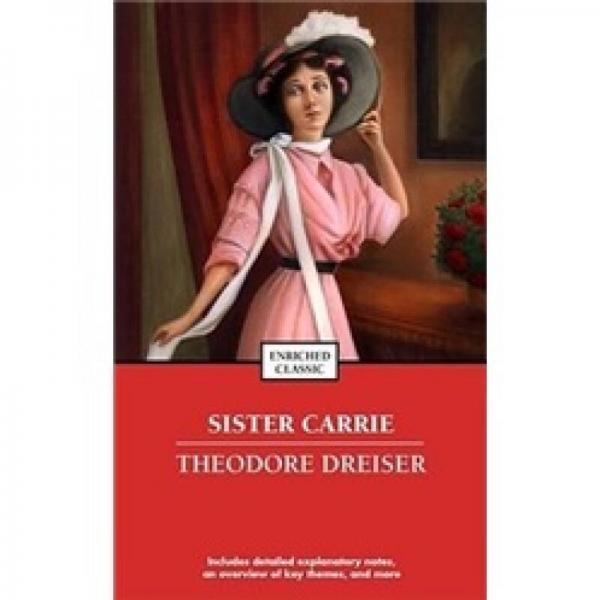内容简介
CarrieMeeberleavesherhomeinruralWisconsinforbig-citylifeinChicago,andfacesaseriesofstruggles—professional,moral,andromantic—beforeachievingsuccessintheNewYorktheaterscene.THISENRICHEDCLASSICEDITIONINCLUDES:AconciseintroductionthatgivesthereaderimportantbackgroundinformationAchronologyoftheauthor'slifeandworkAtimelineofsignificanteventsthatprovidesthebook'shistoricalcontextAnoutlineofkeythemesandplotpointstoguidethereader'sowninterpretationsDetailedexplanatorynotesCriticalanalysis,includingcontemporaryandmodernperspectivesontheworkDiscussionquestionstopromotelivelyclassroomandbookgroupinteractionAlistofrecommendedrelatedbooksandfilmstobroadenthereader'sexperienceThedrivingforcesofourculture--restlessidealism,glamorousmaterialseductionsandspiritualinnocence--arerevealedinDreiser'stransformationoftheconventional"fallenwoman"storyintoagenuinelyoriginalworkofimaginativefiction.
作者简介
TheodoreDreiser,oneoftheprincipalexponentsofnaturalisminAmericanliterature,wasborninTerreHaute,Indiana,onAugust27,1871,intoalargefamilyofGermanancestry.Heenduredarootlessupbringingashisparentsmovedtheirtenchildrentodifferenttownsinsearchofemployment.AlongthewayDreiserreceivedanerraticeducationinvariousparochialandpublicschools;hereadvoraciouslyfromanearlyageandwaslargelyself-taught.Hebeganhiswritingcareerin1892asacubreporterfortheChicagoDailyGlobe,anexperienceherecalledinABookAboutMyself(1922;republishedasNewspaperDaysin1931),andlaterwrotefortheSt.LouisGlobe-DemocratandthePittsburghDispatch.Hisyearsasajournalistprovedinstrumentalindevelopingtheexhaustivelydetailedstylethatisthehallmarkofhisfiction.In1894DreiserarrivedinNewYorkCityandbecameeditorofEv'ryMonth,amoderatelysuccessfulliterarymagazine.Encouragedbyapublishingcolleague,heturnedoutshortstoriesandentertainedthoughtsaboutwritinganovel.InOctober1899Dreiserinscribedtwowords—'SisterCarrie'—onacleansheetofpaperandproceededtocomposeabreakthroughworkthatpropelledAmericanliteratureintothetwentiethcentury.'Ihavefoundamasterpiece...itmustbepublished,'saidFrankNorris,areaderforDoubleday,PageandCompany,towhomDreisersubmittedthemanuscript.(ThefirmhadjustbroughtoutNorris'snovelMcTeague,anotherunretouchedpictureofAmericanlife.)DespitethestrongobjectionsofseniorpartnerFrankDoubleday,whodetestedthebookandrefusedtopromoteit,SisterCarriewaspublishedonNovember8,1900.Thereviewswereviolentlyadverse,andthenovelsoldpoorly.GenteelreadersperceivedtheunsparingstoryofCarolineMeeber'srisetorichesasadirectaffronttothestandardsbywhichrespectableAmericansclaimedtolive.'Ultimately,whatshockedtheworldinDreiser'sworkwasnotsomuchthethingsthathepresentedasthefactthathehimselfwasnotshockedbythem,'observedRobertPennWarren.ThecommercialfailureofSisterCarrieforcedDreisertoabandonfictiontemporarily,andoverthenextdecadeheoccupiededitorialpositionsonseveralpopularmagazines.WiththeencouragementofH.L.Mencken,oneofhismostpersistentdefendersandpromoters,Dreisereventuallyresumedwriting.Hissecondnovel,JennieGerhardt,wasbothacommercialandapopularsuccesswhenitappearedin1911,thoughmanyregardedthisfrankstoryaboutthesexualexperiencesofayounggirlasathreattomoralstandards.AfteritspublicationDreiserpledgedallofhiscreativeenergytoliterature,writingTheFinancier(1912),astoryabouttheriseofanunscrupuloustycoon,whichbecamethefirstbookinatrilogythatincludedTheTitan(1914)andTheStoic(1947).Dreiser'snextnovel,The'Genius'(1915),ahighlyautobiographicalworkportrayingtheartistasNietzscheansupermanwholivesbeyondconventionalmoralcodes,wasthreatenedwithcensorship.ThesuccessfulcampaigntosaveitfromsuppressionprovedapivotalvictoryinthefightforAmericanliteraryfreedom.DuringthisperiodDreiseralsowrotetwoengagingmemoirs,ATraveleratForty(1913)andAHoosierHoliday(1916);acompendiumofphilosophicalessays,HeyRub-a-Dub-Dub(1920);twovolumesofdrama,PlaysoftheNaturalandtheSupernatural(1916)andTheHandofthePotter(1919);aswellasseveralcollectionsofshortstories,sketches,andarticles,includingFreeandOtherStories(1918),TwelveMen(1919),andTheColorofaGreatCity(1923).ThepublicationofAnAmericanTragedyin1925establishedDreiserastheforemostAmericannovelistofhistime.Basedonnewspaperaccountsofasensationalmurdercase,theworkwasdramatizedonBroadwayandsoldtoParamountPictures,whichreleasedafilmversionin1931.YetafterwardDreiservirtuallyabandonedthenovelasanartform.Hecomposedtwobooksofpoetry,Moods,CadencedandDeclaimed(1926)andTheAspirant(1929).HealsowroteChains(1927),asecondvolumeofshortstories,andAGalleryofWomen(1929),acollectionofbiographicalsketches.Dawn,anotherworkofautobiography,cameoutin1931.Dreiserbecameincreasinglypreoccupiedwithphilosophicalandpoliticalissuesduringthelasttwodecadesofhislife.Twovolumesofessays,DreiserLooksatRussia(1928)andTragicAmerica(1932),reflecthisgrowinginvolvementwithsocialism.AmericaIsWorthSaving(1941),thelastbookDreiserpublishedduringhislifetime,announcedhiscompleteconversiontoCommunism.In1944,theyearbeforehisdeath,hewashonoredwithanAwardofMeritbytheAmericanAcademyofArtsandLetters.TheodoreDreiserdiedofaheartattackathishomeinHollywoodonDecember28,1945.Histwolastnovels,TheBulwark(1946)andTheStoic(1947),appearedsoonafterward,alongwithTheBestShortStoriesofTheodoreDreiser(1947).SeveralworksdrawnfromDreiser'sunpublishedpapersanddiariesappearedinlateryears,notablyLettersofTheodoreDreiser(1959),TheodoreDreiser:ASelectionofUncollectedProse(1977),AmericanDiaries,1902-1926(1982),andAnAmateurLaborer(1983).Threevolumesofhisearlyjournalismwerealsoissuedposthumously:SelectedMagazineArticlesofTheodoreDreiser(1985),Journalism,VolumeOne(1988),andTheodoreDreiser's'HeardintheCorridors'ArticlesandRelatedWritings(1988).'Dreisermorethananyotherman,marchingalone,usuallyunappreciated,oftenhated,hasclearedthetrailfromVictoriantimidityandgentilityinAmericanfictiontohonestyandboldnessandpassionoflife,'concludedSinclairLewis.
